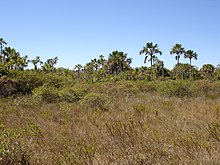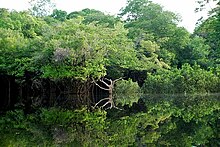This article needs to be updated. (August 2021) |


The indirect land use change impacts of biofuels, also known as ILUC or iLUC (pronounced as i-luck), relates to the unintended consequence of releasing more carbon emissions due to land-use changes around the world induced by the expansion of croplands for ethanol or biodiesel production in response to the increased global demand for biofuels.[1][2]
As farmers worldwide respond to higher crop prices in order to maintain the global food supply-and-demand balance, pristine lands are cleared to replace the food crops that were diverted elsewhere to biofuels' production. Because natural lands, such as rainforests and grasslands, store carbon in their soil and biomass as plants grow each year, clearance of wilderness for new farms translates to a net increase in greenhouse gas emissions. Due to this off-site change in the carbon stock of the soil and the biomass, indirect land use change has consequences in the greenhouse gas (GHG) balance of a biofuel.[1][2][3][4]
Other authors have also argued that indirect land use changes produce other significant social and environmental impacts, affecting biodiversity, water quality, food prices and supply, land tenure, worker migration, and community and cultural stability.[3][5][6][7]
- ^ a b Cite error: The named reference
Searchinger0208was invoked but never defined (see the help page). - ^ a b Cite error: The named reference
WangLetSciewas invoked but never defined (see the help page). - ^ a b Gnansounou; et al. (March 2008). "Accounting for indirect land-use changes in GHG balances of biofuels: Review of current approaches" (PDF). École Polytechnique Fédérale de Lausanne. Retrieved 2009-06-07. Working Paper REF. 437.101
- ^ Cite error: The named reference
OpedFarrelwas invoked but never defined (see the help page). - ^ Donald Sawyer (2008-05-27). "Climate change, biofuels and eco-social impacts in the Brazilian Amazon and Cerrado". Philosophical Transactions of the Royal Society. 363 (1498): 1747–1752. doi:10.1098/rstb.2007.0030. PMC 2373893. PMID 18267903. Published on line 2008-02-11.
- ^ Naylor; et al. (November 2007). "The Ripple Effect: Biofuels, Food Security, and the Environment". Environment. Retrieved 2009-06-07.
- ^ Renton Righelato; Dominick V. Spracklen (2007-08-17). "Carbon Mitigation by Biofuels or by Saving and Restoring Forests?". Science. 317 (5840): 902. doi:10.1126/science.1141361. PMID 17702929. S2CID 40785300.
© MMXXIII Rich X Search. We shall prevail. All rights reserved. Rich X Search
